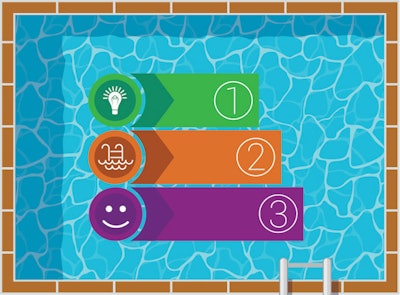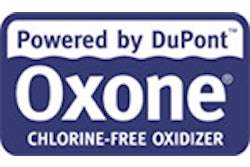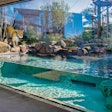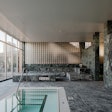
A co-worker recently told me that our real competition doesn't come from the pool industry — it's the RV, boat and vacation businesses that contend for our customers. They're all products that may come with a substantial investment, but are purchased by customers who want to enhance their lives.
That insight made one thing clear to me – the pool sale is never about the money. Customers are willing to spend a lot of money to enhance their lives. In the case of a pool, they've already decided that enhancing their life is more important than having the money in the bank.
For potential customers to feel good about purchasing a pool, they must visualize how that investment will impact their lives and bring joy and happiness to them and their families. Maybe they want a place where they can spend time with their children away from a computer screen. Perhaps they're newlyweds who want a place to host get-togethers with friends. Or maybe they're homeowners who just want a tranquil place to unwind after a busy day with a glass of wine.
To get at the "why" of owning a pool and focus on exactly what the customer wants, one of the most apt questions a builder can ask is, "So, why are you interested in adding a pool to your home?" At the end of the day, builders are in the business of creating lifestyle experiences for customers. To sell that dream, it's key to understand the customer's motivations and paint a picture of the end result.
RELATED: How to Deal with Low-Balling Pool Builders
Here are three steps to design the ultimate experience (note: not the ultimate pool) for your customers while ensuring repeat and referral business.
Flowing with Features
The most successful pool designs not only deliver the experience the potential customer knows they want — they keep on delivering an experience they didn't know they wanted. In other words, the design delivers the delights.
I've heard more times than I can count that "it's the design" that matters, referring not to the pool, but to the experience. What's the difference? If thought of in terms of senses and emotions, it's the sound, light, the activity of play or a peaceful stillness. It may be the perfect backdrop for Facebook or Instagram pictures. Do they want to want their friends and family back home to come visit their private resort? Do they just want their kids to have the same experience they had playing Marco Polo as a kid, or does the busy executive just want to wind down after a hectic day? Those experiences lead to very different designs and features.
Once the customer sees a design they emotionally connect with, every other proposal — regardless of price — misses the whole point. All competing proposals are just a big, expensive, hole in the ground, connected to a bunch of pipes, wires and boxes. And when the alternative feels like a waste of money, a 10 or 20 percent price difference seems totally worth it.
Remember when the iPhone came out? It cost twice as much as a Blackberry. But the Blackberry seemed like a $300 waste of money because it didn't have a built-in iPod like the iPhone did. (The ability to connect to the web actually wasn't a headline feature when the iPhone first launched.)
The one who connects with the customer gets the sale. Your personal curiosity and interest in their story and what makes them tick will tell you a lot about them. You can ask questions like, "There's lots of things you could spend a lot of money on — I'm always curious to hear why people decide to take the plunge. What's made you decide on a pool?" or "What made you decide to finally send us the email?"
Potential clients have their own unique story, and they'll want to share it with you. From there, it's a more straightforward process of solving that experience puzzle with sights, sounds, shapes and colors to fit their wants. From deck jets and bubblers to waterfalls and beach entries, putting together the right combination of features is like solving a customer experience puzzle.
It's not about maximizing profit on any single sale; it's about maximizing customer enjoyment — price has nothing to do with it. Not every feature is right for every pool owner. Instead of selling customers as many features as possible, add in the features that will deliver the best experience.
The Automation Necessity
Automation is not a feature. It's what ensures the owner experiences and enjoys the features. Just because a pool has deck jets, or a scupper, doesn't mean the owner enjoys the deck jet or the scupper. If they aren't enjoying the deck jet, where is the value? If the customer has to turn a valve to enjoy the deck jet, how often will they actually enjoy it? The design element that is enjoyed isn't the one that's merely installed — it's the one that's used, seen and heard. What matters is that the look, feel, sounds and mood that makes the customer tick is the mood that they experience and enjoy, often.
For most pool owners, Wednesday night after dinner probably isn't when the pool is used, but looking out the window while doing dishes and seeing a couple laminar jets shooting into a dark pool might just feel good because they've worked hard in life, and those jets provide a unique reminder of how fortunate they are. Or perhaps those jets create just enough noise to drown out the traffic and create the tranquil environment that helps the owner get lost in a good book. Without automation, these experiences don't happen effortlessly — or worse, they don't happen at all.
Automation, tied to pool owners' desires, no matter how subtle, ensures they enjoy and fully experience their pool. This in turn creates customers who convince their friends they too should have a pool, and a pool designed by you, because you listened. In the scheme of things, automation doesn't add that much to the total ticket of the pool, but it can totally change the enjoyment of the pool, and yes, improve your bottom line.
RELATED: Five Tips for a Successful Pool Building Consultation
Many of the best, most successful builders we meet don't build high-end pools. But most do know how to listen, and they often tell me "automation isn't an option." Put another way, because these builders care about their reputation as a builder and designer, they don't allow their customers to opt out of the best possible experience.
There's an App for That
In addition to automation, app control of a pool ensures the memorable pool experience happens without a hitch. Imagine your customers at soccer practice, during a conversation with other parents, seeing the kids are bonding, and inviting them over so the kids can have fun. These pool owners just pull up the app and start the cleaner without even breaking from the conversation. Imagine your customer on a date at dinner, turning on the spa and heating the water so the spa is ready to go before the check has even arrived. These are experiences that just don't happen without the flexibility to control the pool system on the go.
Imagine this: You're sitting around the kitchen table at a potential customer's house. They're tired and had a hectic, stressful day. You know this because you asked probing questions. You acknowledge that feeling, explaining it's been a busy day for you too. It just so happens that this is the last sales call of your day, and you need to relax in your spa. So you pull out your phone and show how, with just a few taps, the spa is on and set to your perfect temperature.
Through your body language, you can communicate that feeling of relaxation you're already enjoying, simply by knowing your spa will be ready when you get home.
"How nice is that?" you ask. I bet you'll like their answer.
The app helps illustrate key parts of the pool and spa ownership experience — its ease and convenience. It also ensures that you don't let them opt out of fully experiencing the design, because once they have automation, you can pretty much guarantee they enjoy it by setting up just a few simple schedules.
It's a cliché because it's true: As professionals within the pool industry, we have to constantly remind ourselves that we're in the business of enhancing lives. As a pool builder, as a designer and yes, as a salesperson, the goal is always to ensure your customers enjoy the best possible experience and get their money's worth out of the backyard.
Customers quickly forget how much they spent. They may remember they spent more than they wanted to, but they'll be grateful they did. Who ever says, "I wish I had spent 10 percent less for the house we liked almost as much?" No one.
Customers will remember the priceless moments, the experiences, the laughs and the pictures they'll enjoy for years to come. If it's about the price, you're doing it wrong — or they're doing it wrong. And the customers who value the experience know others who do as well, and they'll be sure to convince their friends that a pool is better than an RV.
David Goldman is the director of product marketing at Zodiac Pool Systems.
Comments or thoughts on this article? Please e-mail [email protected].











































